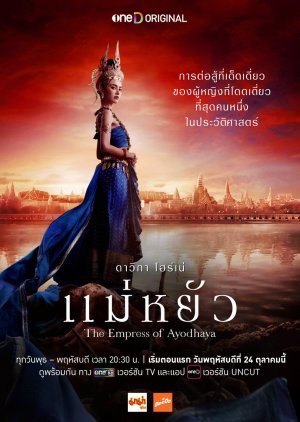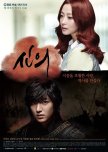
Nicely crafted, dramatized depictions of historical figures.
‘Empress of Ayodhaya’ is a fictionalized story of Phraya Mae Yuhua Sri Sudachan, the one of four first-class concubines of King Chairachathirat and her journey to power and influence in the ancient kingdom of Ayodhaya.When it comes to drama centered on monarchs and royal courts, betrayals, alliances, and backstabbing are things to expect. Though the story is not something particularly novel, the storylines are nicely crafted and presented in fast-paced and engaging plots. The affair between Sri Sudachan and Phan Butsrithep adds a more complex layer to the story as they plot to take over the throne.
One thing I like about this drama is the well-developed protagonists and antagonists. Davika did a pretty good job portraying Jinda/Sri Sudachan, distinguishing it from other historical roles she played before. Though, at times her acting seems to lack impact, she managed to bring complexity to the character. Film Thanapat's performance as devious Phan Butsrithep is commendable. The character deserves all the hate.
While this drama doesn't depict a heroic, strong woman, it shows a journey that takes us back to a time when women had to rely on their wit and intelligence to navigate the complex and often treacherous world of royal courts. It doesn’t always take physical strength to win over something. And I also like that this drama focuses less on the rivalry between the four concubines (Thao Indrasuren, Thao Indratevee and Thao Sri Chulalak) but rather on the significant roles those women played in Sri Sudachan's rise, treachery, and downfall.
It’s recommended for anyone who likes the complexity of ancient Thai history. Just bear in mind that this drama is a dramatized depiction of historical events and figures, so it's not historically accurate. Simply enjoy it for the dramatic storylines it offers.
Was this review helpful to you?

An original take on a unique chapter in Thai history, but loses its way towards the end
The annals of Thai history in the Kingdom of Ayutthaya during the 16th century are sparsely detailed, save for a few chapters of political intrigue. Among them, the story of Thao Si Sudachan, the consort of King Chairacha who became regent to her young son following her husband's death in 1547, only to commit filicide and elevate her lover to the throne as an usurper soon after, is one of the best known. Previously depicted in the 2001 epic The Legend of Suriyothai and 2005's The King Maker, the traditional story depicts Si Sudachan as a scheming villainess who upsets the peace of Ayutthaya (also known as Ayodhya, according to some sources). But history is written by the victor, and it's always inviting to imagine what the other side of the story might be.One31's The Empress of Ayodhaya does just that, giving an original reimagining of Si Sudachan's life from her point of view. As a work of historical fiction, it opens solidly, clearly laying out the history and tying the characters to their historical counterparts. The opening episodes shine with their focus on the intricate palace intrigue between various factions, in a manner that evokes the early seasons of Game of Thrones. Si Sudachan (Mai Davika), here known by the fictional personal name Jinda (Si Sudachan being a royal title), is introduced as a strong and intelligent female figure intent on playing the game in order to put herself on the throne and reunite with her lover Wamon (Film Thanapat). The series features pretty much everything one would expect from an epic historical piece, with some modern twists. The acting is great, and the sets, costumes, and art design are marvellous (to the layperson at least. Will have to defer to experts regarding historical accuracy). While there are noticeable goofs here and there, they aren't so serious as to detract from the whole story.
But the story pretty much loses its way towards the end. In overextending their efforts to have the audience sympathize with Jinda, the writers turn what was initially a strong, interesting, morally grey character into a passive, helpless victim in constant need of rescue. Where in episode 1 Jinda shows rumours of supernatural events to be superstition, black magic suddenly exists and is real by episode 7. The factional struggles ultimately devolve into a simplistic good-guys-vs-bad-guys tale. While it's understandable that the ending is constrained by the outcome of history, the way it was handled ended up being utterly unsatisfying.
And then there's the animal welfare issue. While I won't judge the work by the issues that happened as part of the production, it still needs to be mentioned. Whatever the ultimate outcome, here's hoping that future productions learn from the lesson.
Was this review helpful to you?

Writing women into a historical framework
Two things increased my appreciation for this, and thus my rating. The ending. And reading up on the history. The long (and so very Thai <3) disclaimer at the beginning states that an aim is to "encourage viewers to take an interest in history...[and to] seek additional knowledge from experts or historians to gain an accurate understanding of Ayuttaya history."It did succeed in getting me interested in the history - primarily what is recorded of Sri Sudachan. There isn't much and it's disputed. We don't even have her name or the names of the other concubines, only their titles. A starting trawl through Wikipedia though shows that the framework of men this story is built around is taken from historical records - Chairachathirat and his connections with Portuguese mercenaries and their war tech, Worawongsathirat and his many titles, Yotfa, Sri Sin, Phirenthorathep, Chan, Ratchasaneh.
And also things written about Sri Sudachan herself, or rather the fictionalised versions others chose to tell.
Part of me wishes I'd waited as I spoiled a few things for myself near the end, but it also brought the creators' intentions into sharp, crystal clear, unquestionable focus - this isn't a "historical" fiction flight of fantasy - it's very much about filling in gaps and creating a space for women to exist in that history. One woman, in particular, whose existence was recorded by those who benefitted from making her a villain.
Some of this short lakorn is difficult - war and brutal actions are depicted, sometimes on screen, a few thankfully implied. It's about power, corruption and conflict. It's condensed melodrama too, which will throw some off, especially those who are used to epic long Chinese court intrigues. That's just a different way of telling a story.
Through it all are the women - concubines, confidantes and servants, armed women guards and their leader - their conflicts with each other and struggles to figure out how to get by in a world where they are pawns with limited power and room to move, who they truly love and who they can truly trust.
For these few days, this woman - whose name the men couldn't be bothered to record - was alive again. They did a fantastic job with bringing her, and all of the complicated emotions of a woman in her position, to life.
Links in a comment under a spoiler for those who want to read more. So far it's just Wikipedia as they're understandable summaries and even within these few pages, it's clear how each one takes a different view of Sri Sudachan. I recommend waiting until you've finished the lakorn.
Was this review helpful to you?



































